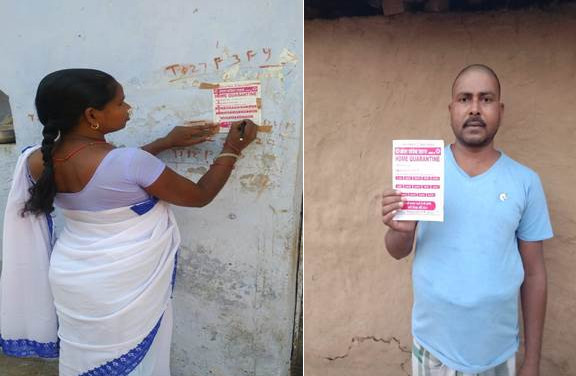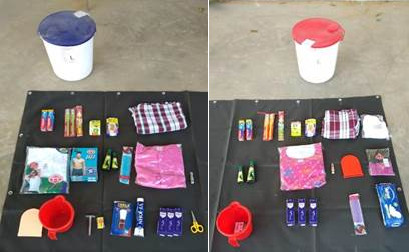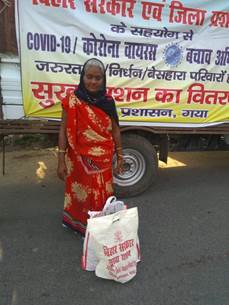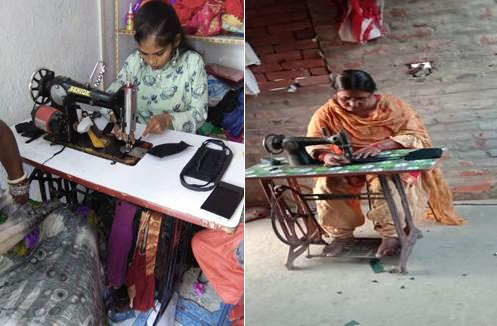Gaya is the second largest city in the state of Bihar. Being among the holy pilgrim centres it attracts a large number of visitors making it vulnerable to the ongoing pandemic situation in the country. The district administration has been attentive and taking all measures in view of a large number of tourists and migrants. The situation has aggravated after the detection of five COVID-19 positive cases in the district. A 24*7 helpline has been launched to assist all the needy. Helpline numbers are made available to the public to seek any help related to corona. These helpline managers are also responsible for convergence between departments by transferring the complaints to the respective departments. To ensure the safety of the residents and the migrants, registration centres have been opened in all the 24 blocks of the district. While registering the details of the migrants, whether they have ration cards is verified. Information about people without ration cards is directed to the call centres and the collected data is shared with the respective block offices in the district. Through the helpline facility, a fast-track method has also been adopted to create required documents for the people who had applied previously. This fast-track service includes identification cards of migrant worker/BPL card holders who applied for important or urgent documents. Keeping in view of the distressed situation among the rural poor and labourers outside Gaya, District Administration is providing handholding support in the form of noting their queries down and conveying the concerned districts. The task force is responding by calling the district helpline number and keeping the communication intact. Under the Chief minister’s pioneering scheme of providing 1000 rupees to the migrants stranded outside Bihar, around 10,000 people of Gaya have applied with the help of “Bihar Corona Tatkal Sahayta” mobile application.

Ensuring home quarantine being practiced properly
The facility of quarantine has been established at three levels: District, Block and Panchayat. Each facility has been assigned to a Nodal officer, ANM and ASHA to provide facilities to all people. The bed strength of the district is around 5500 out of which 2797 are currently occupied. The district administration received a list of 14,571 migrants entering through borders, out of which 10,890 were home quarantined and 2797 were shifted to quarantine centres. Migrant workers who registered themselves with the government are readily admitted to the quarantine homes. There are 332 active centres in the district. These workers are kept under observation for 14 days and if there are no symptoms for COVID-19, they are transported to their homes. If they show positive symptoms for the virus, they are transferred to the isolation centres. District has established four isolation centres with a 247-bed capacity spread over the district. Two such isolation centres are located in the sub-divisions named Sherghati and Tekari with a total 80 bed strength. The others are ANMCH with a total 130 bed strength, Mahkar additional primary health centre in Khezarsai block with 25 beds and District Hospital with 12 beds. In addition, there are four disaster relief centers in the district with a bed capacity of around 268 people. Migrants and residents who have no place to go or are in dire need of food are being kept here and fed with proper facilities. Each migrant worker is provided with basic facilities like a cot, mattress and mosquito net and also a dignity kit keeping sanitation and hygiene in mind. It consists of:
- Toothpaste
- Toothbrush
- Bathing soap
- Shaving kit (for males)
- Sanitary napkins (for females)
- Towel
- Oil
- Bucket
- 2 set of clothing
- 3 sets of undergarments.
CSR and crowd donation are promoted for providing more essentials in these centres. Dry ration is arranged with the help of donors and institutions for the people who are not recovered under the food safety net. The task of distributing food to everyone is accomplished by preparing long lists from the distressed calls on the helpline number. On an average, 10,000 packets are being distributed every day. Donors are also provided with the liberty of mentioning a particular area, where they wish to distribute the food packets.

Dignity kit for males and females
To ensure that the admitted people get safe food, following steps are being undertaken
- The food is cooked in the block headquarters
- Prepared food is distributed in the centres.
- The food is cooked by the jeevika didis
- Appropriate precautions are taken while preparing the food and also while serving it.
- Social distancing is practiced while cooking, serving and eating food.
Our on-ground health workforce consisting of around 675 ANM, 3463 ASHA and 199 doctors and other health staff is operative on ground in full swing. Keeping the safety of frontline worker as utmost priority, training programmes has been conducted through NDRF (National Disaster Response Force), to equip the staff with basic understanding and responding to basic symptoms for the viral infection. Major component was the use of mask and PPE material and basic precautions that needs to be followed.

Dry ration being distributed by the district administration

Food served at quarantine centre maintaining social distancing
At the quarantine centres, monitoring is happening by attaching doctors, ANMS and ASHA. Through “Chakshu” Application, District is monitoring people who were home quarantined, where data related to migrant’s arrival, place, symptoms etc is being filled. Regular follow up is happening by updating daily symptoms and actions taken by Asha and ANM in the application. A pamphlet has also been put outside their houses, which is filled by ASHA every day on their responses of showing any symptoms. ASHA fills the pamphlet and puts her signature so that it becomes a transparent activity and everybody gets aware. To track the people not registered in data, pharmaceutical data is being leveraged and the patient is tracked on daily basis if containing virus symptoms.

Jeevika Didis making mask at their homes
The District Administration has stepped various response measure to avoid panic among consumer, biggest wholesalers and vendors have been approved by district such as Big Bazaar Vishal Mega Mart and many more to home deliver essential food items and commodities. The process is very simple, a designated number has been given by each store, through messaging and WhatsApp consumer can avail the benefit of home delivery by paying minimal charge of 50 rupees. For vegetables, techniques of spacing out has been adopted. The vehicles which carry these essential items are being fumigated. To prevent the spread of virus, vendors are provided with masks and gloves and marking for the public has also been done in these places. Officials and members of NCC, NSS and NYK are always present in the markets to ensure social distancing.
The district faces challenges like lack of masks, which has been curbed by employing jeevika didis to make the mask. They have been given order of 25000 masks, out of which 6000 have been already delivered. To combat the situation of overcrowding in banks, promotion of cash withdrawal through post offices is being encouraged. Additionally, 212 Grameen Dak sevaks with mobile based withdrawal facility are engaged to provide door to door withdrawal facility up to 10000 Rupees in 11 rural blocks. For the herbal sanitizer, the municipal corporation is preparing it by themselves and sanitizing the main hotspots of the district. Moreover, the district administration is taking some extra efforts in the hotspots where people have positive results for the Covid 19 virus. To sanitize localities, buildings and streets two drones have been deployed. The drone sprays the herbal sanitizer prepared by the municipal corporation on their own to all the marked places.

